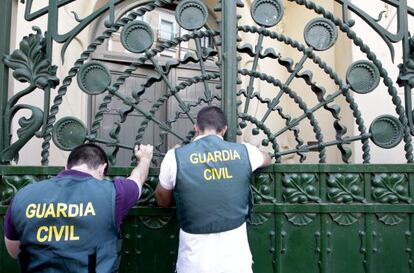Trouble returns to Spain’s controversial copyright agency
Antón Reixa retains presidency of SGAE by a whisker as rival turns on "illegal" accounts

A year after winning the elections and proclaiming the birth of "a new SGAE," president Antón Reixa has still not managed to silence the critics. Many of the copyright management entity's governing bodies have been overhauled, and there is more transparency than ever before. But the shameless power struggles have not ceased since a large-scale corruption scheme was discovered, allegedly involving four of SGAE's executives including the long-running former president Teddy Bautista.
They and five other people were arrested in 2011 in a highly publicized police raid against SGAE's Madrid headquarters and charged with embezzlement, fraud and gross misadministration over a racket that allegedly diverted large sums from SGAE to private firms controlled by executives from the collection agency. The alleged fraud took place between 2003 and 2007.
Last Thursday, the general assembly gave 21,740 members (of a total of 106,742) a chance to vote on the way things have been run for the last year. The results were not emphatic in Reixa's favor, but the president held on to his post with 56.13 percent of the vote. Despite the economic crisis and a 16.2-percent drop in revenues (from 320 million to 268.2 million euros), SGAE will be handing out more money than ever: as much as 384 million euros, thanks to an additional 75 million obtained from a fund of titles whose owners had remained unidentified until now, according to Reixa.
Five of the 14 members of the SGAE board refused to sign their names to the accounts in an attempt to force Reixa out of his chair if they failed to be approved. However, the accounts were also ushered through by 10,944 votes to 8,374. José Miguel Fernández Sastrón, a presidential rival during the last election, called the accounts "illegal" and Reixa a "coward." Juan Carmona, another board member, went further: "We need a Gypsy to come in here and give us transparency."
Tensions reached a climax a couple of months ago, when Reixa decided to investigate the activities of 11 SGAE members who have made huge sums of money in recent years by writing music for late-night television shows.
11 members made over 25 million euros by copyrighting music for late-night shows
By using their own production companies, this group of artists went from making 550,000 euros in 2005 (with 106 copyrighted songs), to raking in over 25.7 million euros (with nearly 25,000 titles). They are the people who make the most money, and who hold the most votes at SGAE. The mother of one of them became a SGAE member in 2007 and has since registered 275 symphonic pieces to her name. This collective makes more than the descendants of master composers Isaac Albéniz or Joaquín Rodrigo, and they do so with music that airs almost inaudibly as background to late-night shows.
These individuals resented being criticized and began a fierce online campaign against Reixa. Despite threatening to create a parallel copyright management association, for now they have remained in the fold and actively participated in meetings to drum up the vote against Thursday's accounts presentation.
Meanwhile, Fernández Sastrón has publicly gotten chummy with this group of high earners, offering a joint press conference: "We disagree with the management that led to the approval of these accounts. The wolf is not coming. The wolf is home among us, and his name is incompetence," said Sastrón, one of several board members who supported a censure motion against Reixa.
Sastrón also rejects the way Reixa handled the Arteria theater network owned by SGAE. All the real estate acquired under Teddy Bautista was put on sale through Thesan Capital, which has only managed to sell three so far, in Argentina and Mexico.
A 2011 audit by Ernst & Young recommended that the new SGAE abandon property investments and reconsider its core mission of collecting royalties and sharing them out among members.
Under Bautista, a musician-turned-manager, the SGAE became a regular target of citizens' wrath over initiatives such as the "digital canon," a controversial tax levied pre-emptively on gadgets that store copyrighted digital material, regardless of their actual use. The society is also known to have sent undercover agents to weddings and other private celebrations to check whether copyrighted music was being played.
Now, Reixa is working on a possible pact to gain a stable majority until the end of his term, in exchange for handing over some executive power to the director general. This is what he committed to when he won the elections and set himself the goal of "professionalizing" SGAE. That might be the only way to end the farcical situation at Spain's largest copyright society.
Tu suscripción se está usando en otro dispositivo
¿Quieres añadir otro usuario a tu suscripción?
Si continúas leyendo en este dispositivo, no se podrá leer en el otro.
FlechaTu suscripción se está usando en otro dispositivo y solo puedes acceder a EL PAÍS desde un dispositivo a la vez.
Si quieres compartir tu cuenta, cambia tu suscripción a la modalidad Premium, así podrás añadir otro usuario. Cada uno accederá con su propia cuenta de email, lo que os permitirá personalizar vuestra experiencia en EL PAÍS.
¿Tienes una suscripción de empresa? Accede aquí para contratar más cuentas.
En el caso de no saber quién está usando tu cuenta, te recomendamos cambiar tu contraseña aquí.
Si decides continuar compartiendo tu cuenta, este mensaje se mostrará en tu dispositivo y en el de la otra persona que está usando tu cuenta de forma indefinida, afectando a tu experiencia de lectura. Puedes consultar aquí los términos y condiciones de la suscripción digital.









































